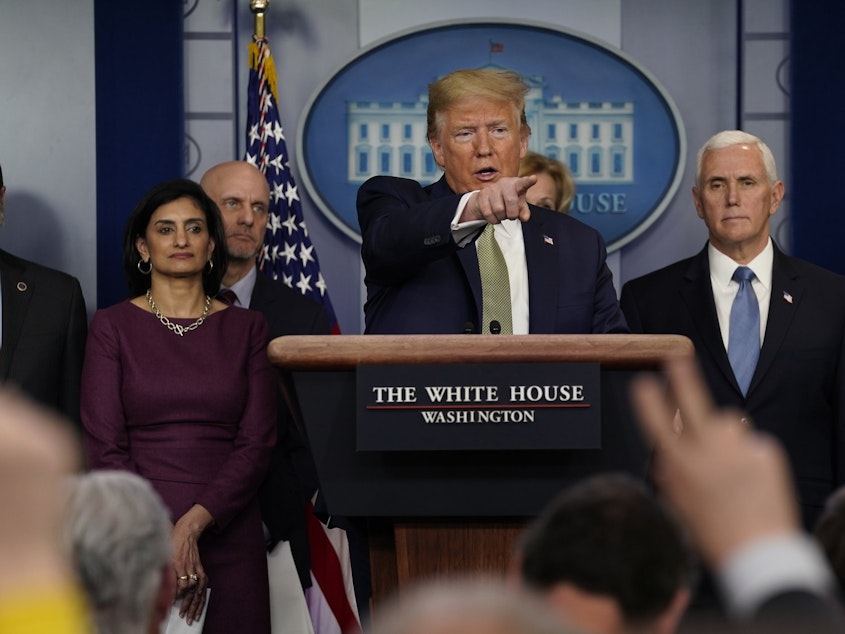White House Pushes for Quick, Direct Payments To Americans In Response To Coronavirus

Updated at 12:57 p.m. ET
President Trump is pushing a plan to send money directly to Americans in response to the coronavirus, saying it's time to "go big" to boost the now stalled economy.
Trump said he wants to push through a major comprehensive package to help businesses and workers facing hardships.
"That's the way I want to go. I just want to get it done and have a big infusion, as opposed to going through little meetings every couple of days," Trump said. "We want to go big."
Treasury Secretary Steven Mnuchin is meeting with lawmakers Tuesday to discuss details of the administration's proposal.
Sponsored
Mnuchin said Trump wants to start sending out checks within the next two weeks.
It's not clear what income restrictions might be put on the stimulus payments, but Mnuchin said they don't want to be sending checks to millionaires.
Trump and Mnuchin did not say how much the proposal would cost, but a person familiar said earlier on Tuesday that the White House is asking Congress for $850 billion in aid.
The administration is also planning to allow Americans to defer tax payments up to $1 million for 90 days.
The impact of the outbreak has ground the U.S. economy to a near standstill.
Sponsored
The briefing comes a day after the White House recommended new guidelines to slow the spread of the coronavirus over the next 15 days, urging older Americans to stay home and asking all residents to avoid crowds of more 10 people and stop discretionary travel and eating out.
Trump has warned the spread of the novel coronavirus may not be contained until July or August.
Meanwhile, dozens of state and local officials are issuing sweeping orders that are closing school for millions of children, shutting down bars and restaurants, and discussing so-called social distancing measures, like mandating that residents stay indoors and work from home.
As of late Tuesday morning, the coronavirus pandemic has infected more than 185,000 people around the world. In the U.S., there have so far been more than 4,600 confirmed cases.
With federal officials this week ramping up testing nationwide, public health experts say the prevalence of the virus in the U.S. is expected to get worse before it gets better, since testing in the country has until now been sparse.
Sponsored
In Congress, on late Monday, the House sent a bill to address paid sick leave and testing to the Senate, which is expected to vote on the measure this week. Earlier this month, Congress passed a roughly $8 billion package to address the response effort.
Additionally, Senate Minority Leader Chuck Schumer proposed $750 billion to raise funding for unemployment insurance, coronavirus treatment and emergency child care assistance. This spending measure is separate from the tax cuts the White House is seeking from Congress.
Stocks have been battered during the crisis despite by efforts by central bankers to assuage investors. On Tuesday, the Dow rose sharply, a day after the index slid to one of its worst sessions ever, falling nearly 3,000 points. This happened despite the Federal Reserve taking emergency action late Sunday in cutting interest rates to nearly zero, a move not taken since the 2008 financial crisis.
Trump had spent weeks downplaying the virus and dismissing the suggestion that the U.S. economy is heading toward a dramatic slowdown, but on Monday, he conceded a recession could be on the horizon. [Copyright 2020 NPR]
